| | Ukraine peace talks gather momentum, Lula offers a defense of multilateralism, and Hollywood depicts͏ ͏ ͏ ͏ ͏ ͏ |
| |   Beirut Beirut |   Hollywood Hollywood |   Sizewell Sizewell |
 | Flagship |  |
| |
|
The World Today | 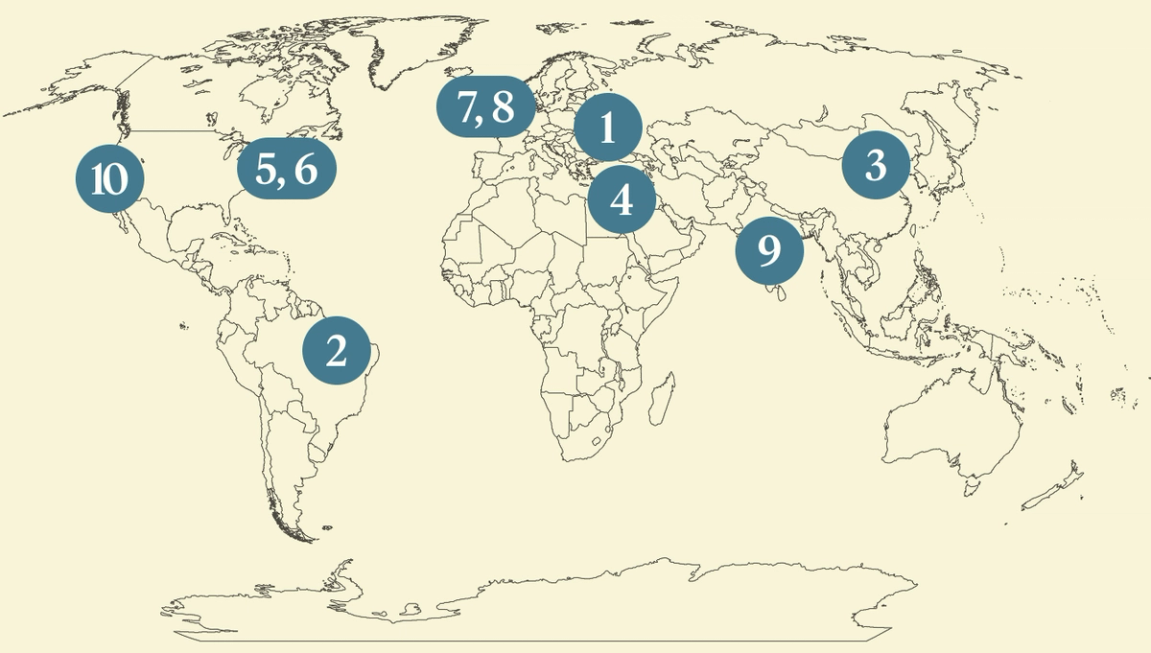 - Ukraine peace momentum
- Lula backs multilateralism
- China rare earths pact
- Israel strike on Beirut
- Trump’s health gamble
- Vaccine fears hit market
- Telegraph newspaper sale
- UK’s expensive nuclear
- Warming hits Indian crops
- Films depict US violence
 The London Review of Substacks, and an exhibition of comic photography in Arizona. |
|
Ukraine peace plan gathers pace |
 Anatolii Stepanov/Reuters Anatolii Stepanov/ReutersUkrainian and European officials expressed cautious optimism that the US was shifting its stance to increasingly favor Kyiv in contested peace talks with Moscow. Analysts had expressed worry that Washington was demanding little of Russia while exacting concessions mostly from Ukraine, as has been typical of fitful negotiations since US President Donald Trump came to office to end the nearly four-year war. Talks between European, Ukrainian, and American officials in Geneva were “light on specifics but left [European] officials feeling more upbeat about the prospects for peace,” Politico reported, while Ukraine’s negotiator hailed “very good progress.” Still, a degree of unpredictability remains: Prior to the talks, Trump slammed Ukraine’s leader for expressing “ZERO GRATITUDE” for American efforts. |
|
In defense of multilateralism |
 Esa Alexander/Reuters Esa Alexander/ReutersBrazilian President Luiz Inácio Lula da Silva said the recent COP30 and G20 summits showed the strengths of multilateralism despite US efforts to undermine both events. “Multilateralism will win,” Lula said at the G20 — having arrived just after hosting the COP summit — adding that US President Donald Trump’s absence at the meetings ultimately “didn’t matter much.” Despite Lula’s tough talk alongside efforts to promote private capital and to address inequality, however, global leaders struggled to achieve concrete results at either gathering: “The best that can be said” of Brazil’s COP30 meeting “is that it managed to avoid regressing on previous commitments,” Semafor’s climate and energy editor wrote. |
|
China seeks rare earths alliance |
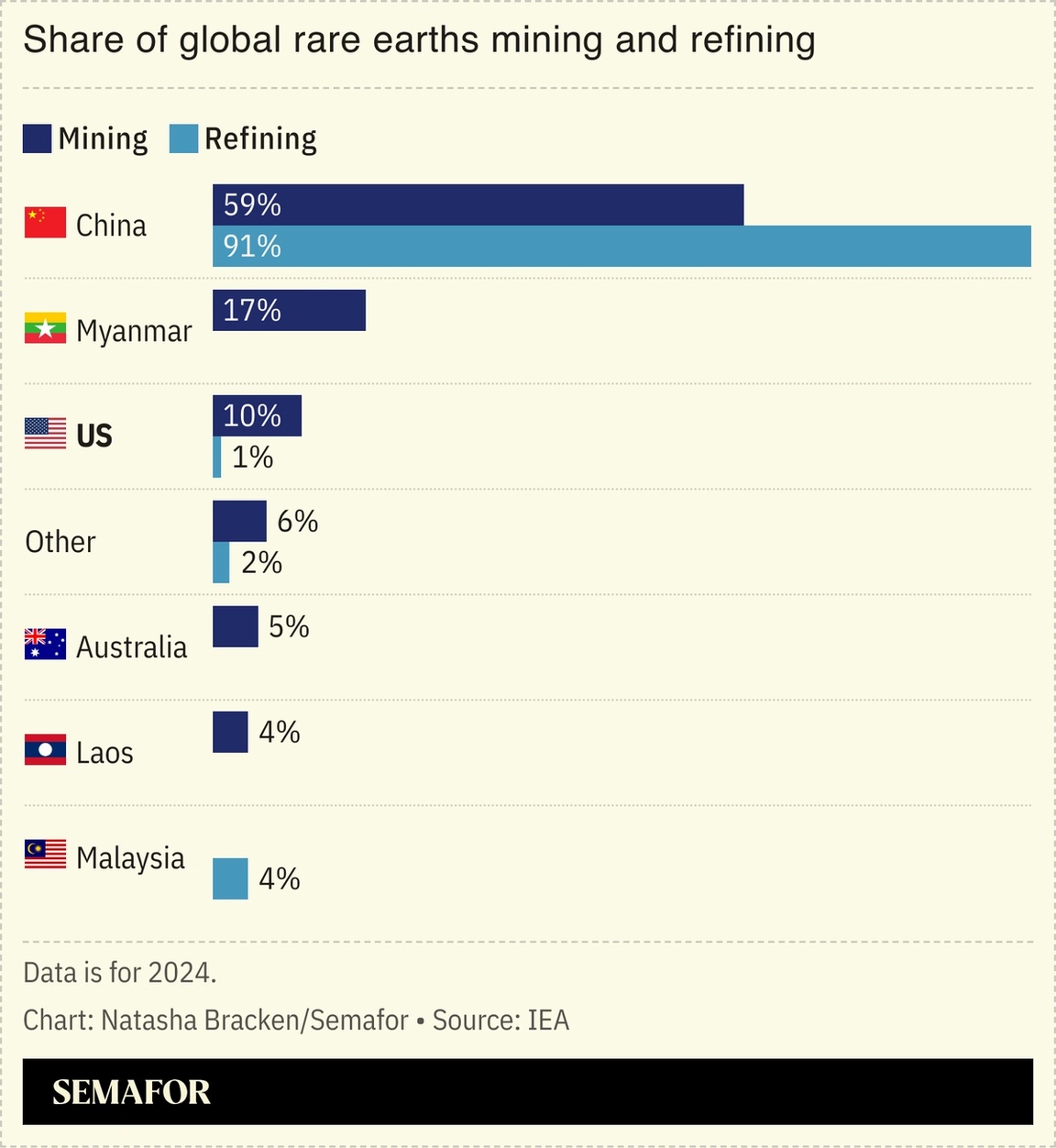 Chinese Premier Li Qiang called for an alliance with other developing nations for rare earths production, as Beijing steps up its competition with Washington over the key minerals. China already dominates the production and refining of rare earths, which are essential for defense and technology manufacturing. Li, the country’s second-highest ranking official, said 19 nations had already committed to join the alliance, while vowing to expand the group. This year, Beijing imposed rare earths export restrictions on the US in response to Washington’s tariffs. While the restrictions have been temporarily paused, the White House has pushed to reduce its reliance on China, signing a deal with Saudi Arabia last week to jointly produce the minerals. |
|
Israel kills Hezbollah leader |
 Mohammed Yassin/Reuters Mohammed Yassin/ReutersAn Israeli air strike killed a senior Hezbollah leader in Beirut, further weakening an already uneasy truce. Israel and Hezbollah agreed to a ceasefire a year ago, but Israel — which says the group has been rebuilding its armories, and that Lebanon is failing in its commitment to disarm it — has ramped up attacks against Hezbollah in recent days. Israel’s ceasefire in Gaza is also shaky: At least 22 Palestinians were killed in strikes on the enclave last week, Hamas-affiliated officials said, in response to what Israel said was an “armed terrorist” attacking soldiers. Gazan authorities say Israeli forces have violated the seven-week truce nearly 500 times, though Washington, which brokered both deals, insists the Gaza pact remains solid. |
|
Trump set to lower health costs |
 Aaron Schwartz/Reuters Aaron Schwartz/ReutersUS President Donald Trump looks set to unveil proposals to lower health care costs, seeking to head off a growing political vulnerability. A coming spike in insurance premiums was at the center of the row that led to this year’s protracted government shutdown; Democrats are bearish on reaching a deal with Republicans, and are hammering the White House on the looming health care cost increase. Partly in response, Trump plans to set out an alternate plan, possibly as soon as today, MS NOW reported. But with lawmakers having largely left Washington for the Thanksgiving holiday period, no short-term legislative deal is on the horizon, and as Semafor’s political team notes today, “Democrats will litigate the issue in the midterms.” |
|
Vaccine skepticism hits Moderna |
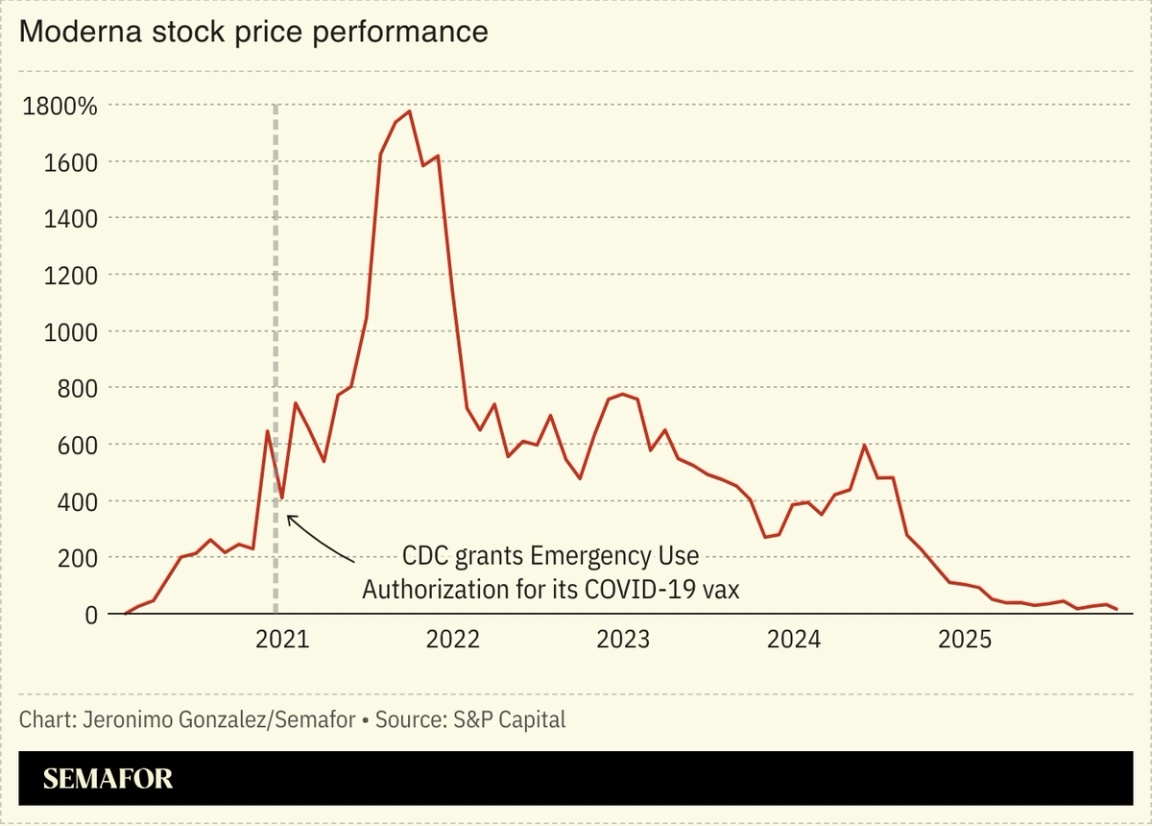 Moderna became the most-shorted stock on the S&P 500 on the back of the Trump administration’s vaccine skepticism. The number of Americans getting COVID shots is down 24% this year, a report found, driving the vaccine maker’s share price to its lowest level since before the pandemic. The US Health Secretary Robert F. Kennedy has long been concerned about vaccines — he personally instructed the Centers for Disease Control to say that the link between vaccines and autism had not been disproved, The New York Times reported. The distrust seems to be reaching the population, evidenced by Moderna’s woes but also by the resurgence of previously well-controlled diseases such as measles and whooping cough. |
|
Britain’s conservative media merger |
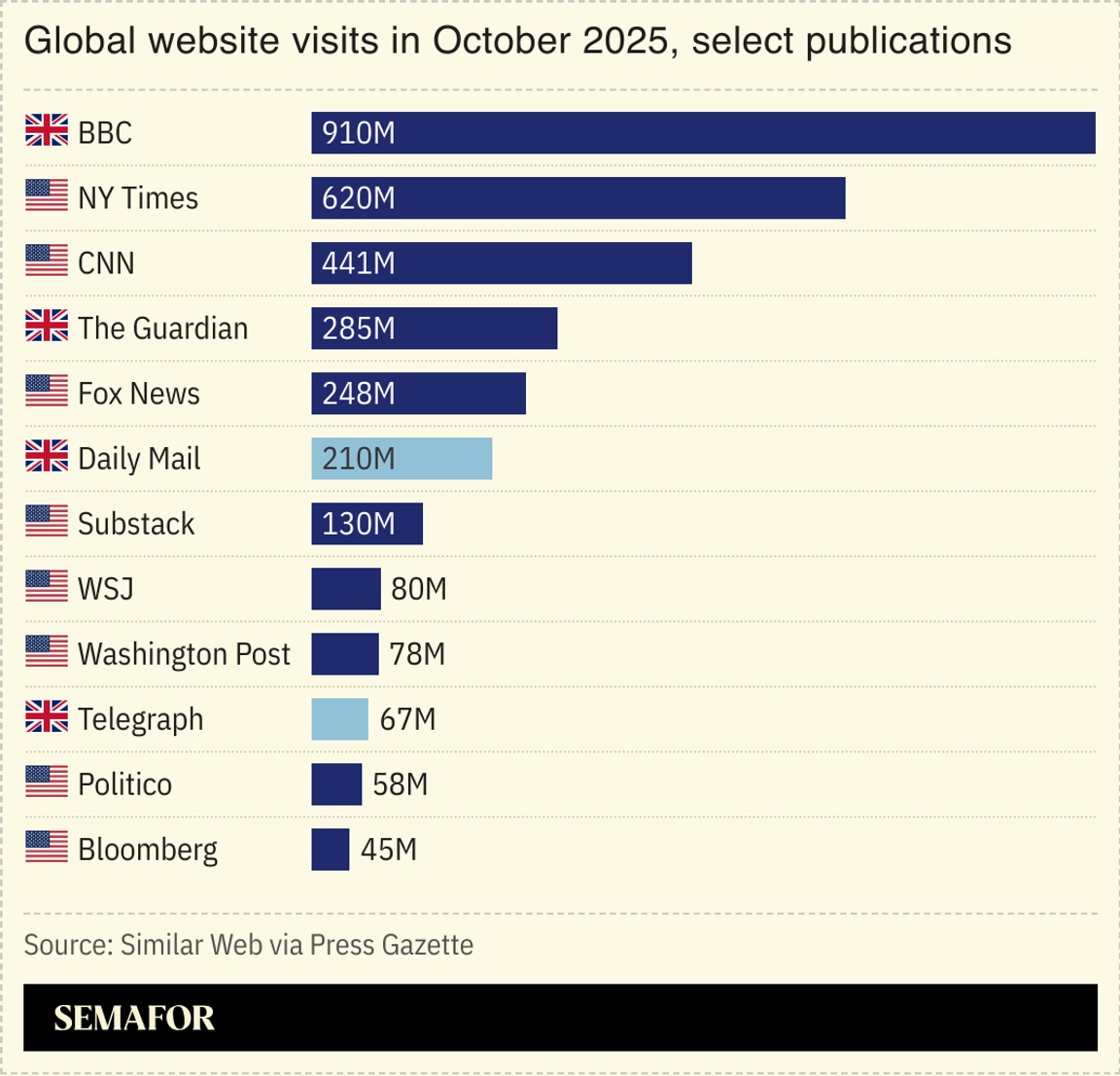 The Daily Telegraph, the 170-year-old British newspaper, looks likely to be sold to its fellow right-wing rival, The Daily Mail. The venerable but troubled outlet has been for sale since its previous owners ran up unsupportable debts and were removed in 2023. Since then, consortia from as far afield as Wall Street and the UAE have circled, trying to win control of the Telegraph’s still-powerful brand. The merger of two of Britain’s best-known conservative papers is alarming to the ruling Labour Party, but the sector itself is looking westward, the Financial Times reported: A rightward shift in the US media landscape under President Donald Trump has “potentially laid the ground for new entrants, even with an English accent.” |
|
The high cost of building nuclear plants |
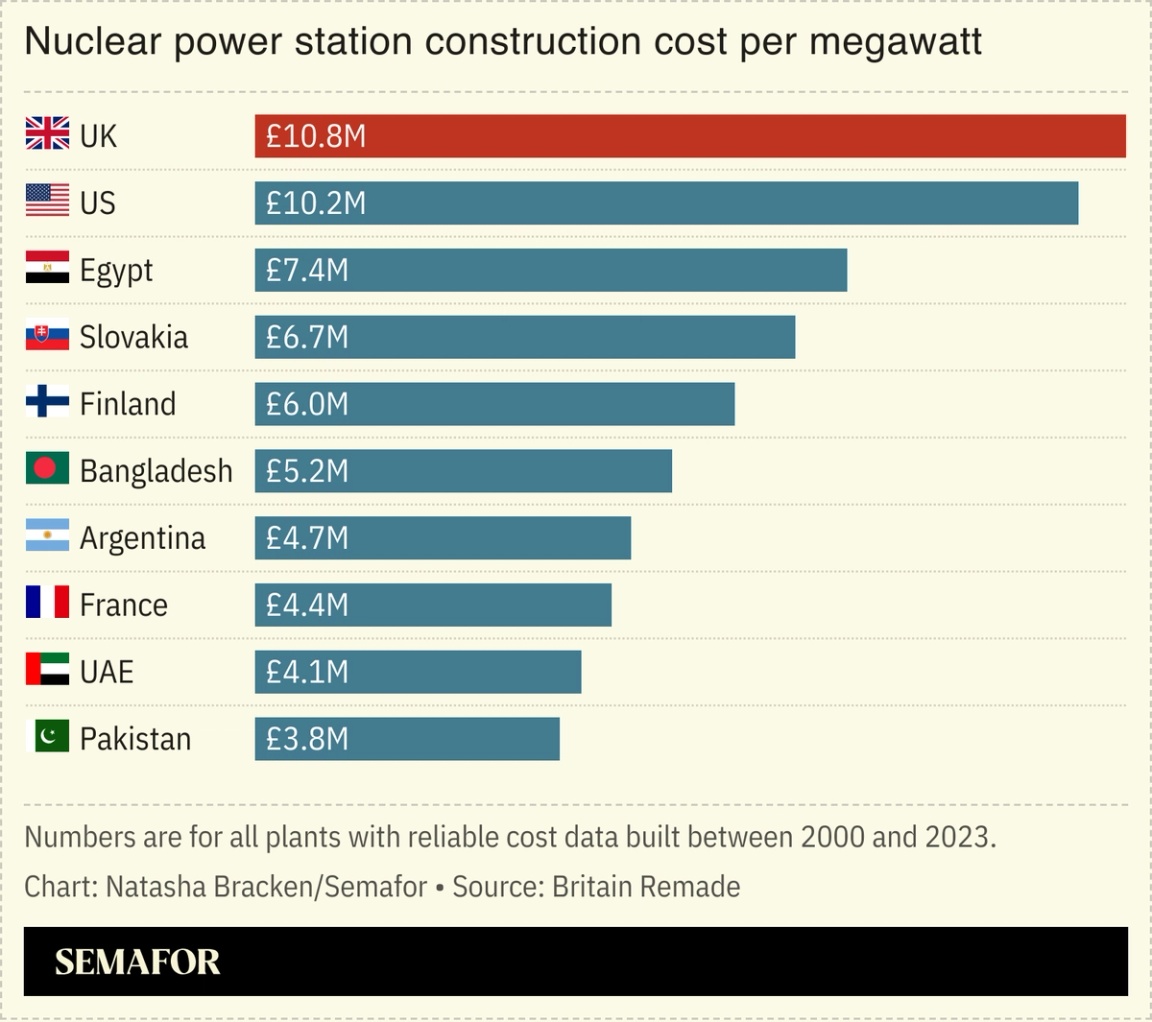 Britain is the most expensive place in the world to build nuclear power, a new government-backed report found. A “systematic regulatory failure,” with multiple points of veto, has hamstrung the industry, the report said, and the oversight regime should be replaced. Britain’s problem, although extreme, is not unusual. In the US and elsewhere, while costs of other forms of new energy have fallen, nuclear has become steadily more expensive, because of requirements that any savings made through technological improvements are reinvested in safety, meaning prices always ratchet up. The problem has become urgent because many countries have pledged to triple their nuclear capacity by 2050 to provide reliable zero-carbon energy to smooth intermittent renewable output. |
|
Key Indian crops hit by climate change |
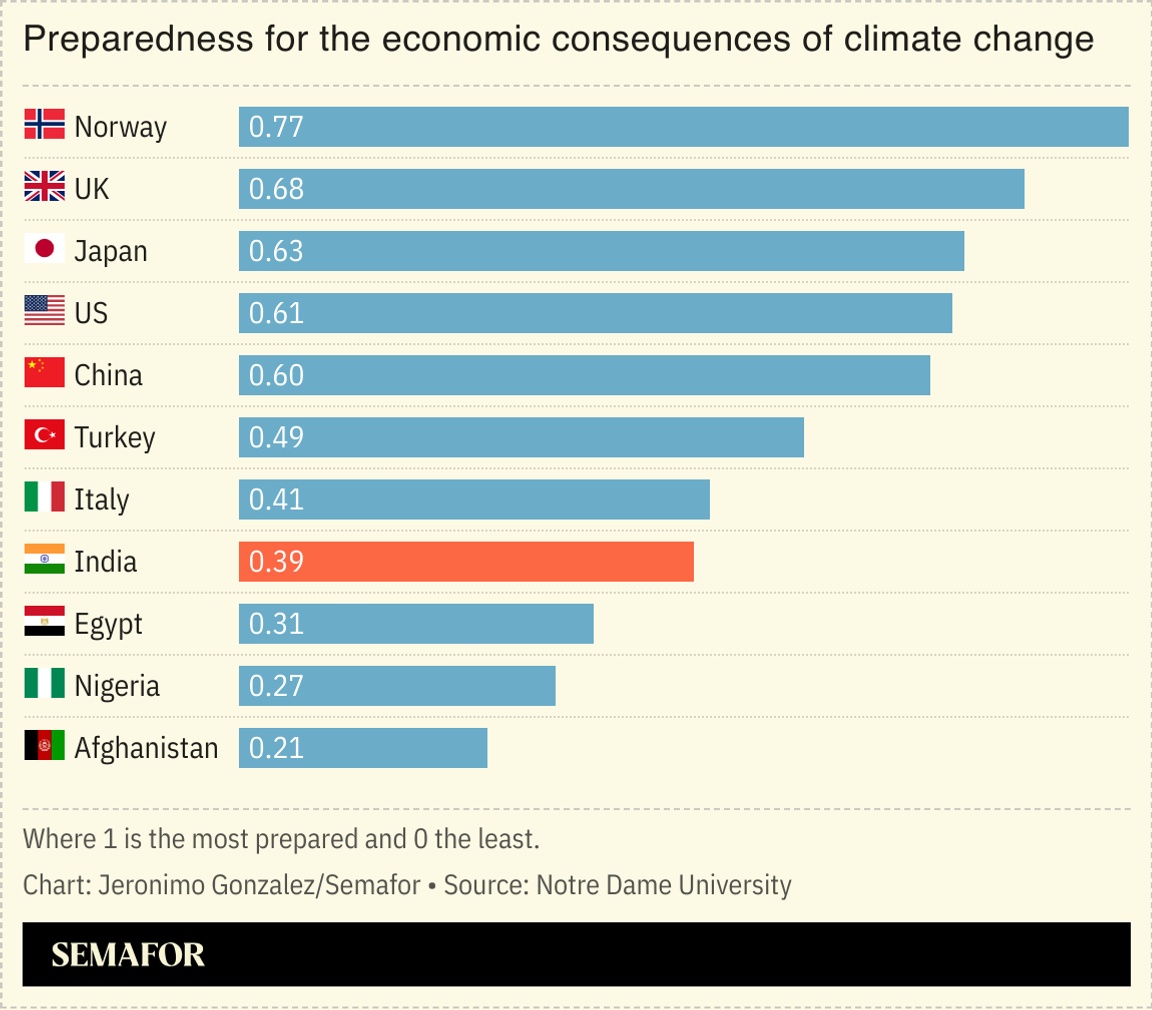 Rising temperatures have devastated two of India’s most prized crops, forcing farmers to look for ways to adapt to climate change as global demand for the products grows in line with rising incomes. Heat has devastated the cultivation of cardamom: Last year’s poor harvest pushed prices up 70%. Meanwhile, India’s tea production dropped almost 6% this year compared to last after temperatures repeatedly topped 35°C (95°F), meaning “the bushes essentially shut down,” an expert told Nikkei. But some help may be at hand: Indian farmers have begun using an app that runs a diagnosis on soil health and provides timely recommendations. “Technology is no longer separate from farming. It is now a daily tool,” an Indian farmer told the BBC. |
|
Hollywood and America’s turbulence |
|
|